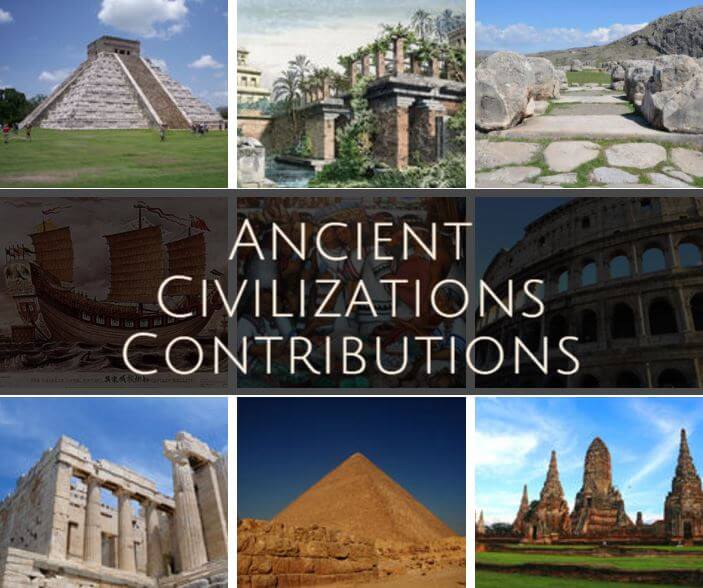
Ancient civilizations have significantly shaped modern society through various advancements in culture, technology, governance, and other fields. By understanding and appreciating these contributions, we gain insight into the development and progression of human civilization. This report explores how several ancient civilizations have influenced today's world.
Technological and Agricultural Advancements
Mesopotamia
Mesopotamia, often recognized as the world's first civilization, made numerous contributions that are still relevant today. One of the most notable is the invention of cuneiform writing, which revolutionized communication and record-keeping[3]. Mesopotamians also developed one of the earliest known calendars, structured around lunar phases and effectively used agriculture, influencing modern calendar systems[3]. The plow, another Mesopotamian invention, significantly enhanced agricultural productivity and remains foundational in modern farming[3]. Additionally, Mesopotamians invented the wheel and established the first forms of urban planning and irrigation systems[1][3][5].
Egypt
The ancient Egyptians were pioneers in various fields, particularly in architecture and engineering. Their pyramids and temples exemplify advanced building techniques and a deep knowledge of mathematics[2]. Egyptians also made significant medical advancements, including the development of surgical methods and the use of herbs and drugs, which influence medical practices even today[1][5][7]. They contributed to the field of writing through the creation of hieroglyphics, one of the earliest writing systems, influencing modern alphabets and written communication[2][3][5].
China
Ancient China was a powerhouse of innovation. Chinese inventions such as paper, printing, gunpowder, and the compass are integral parts of modern technology[1][2][3]. The Chinese also made early advancements in silk production, block printing, and acupuncture, which remain relevant in today's textile industry, publishing, and healthcare[1][5][6].
Philosophical and Scientific Contributions
Greece
Ancient Greece is renowned for its contributions to philosophy, democracy, and science. Philosophers like Socrates, Plato, and Aristotle laid the foundational principles of Western philosophy, which shaped modern critical thinking, ethics, and political theory[2][10]. The concept of democracy, pioneered in Athens, forms the basis of many contemporary political systems[4]. Furthermore, Greek advancements in science and mathematics, including the work of Pythagoras and Hippocrates, continue to underpin modern scientific and mathematical thought[1][10].
India
India's ancient civilization contributed profoundly to philosophical thought, mathematics, and medicine. The concept of zero and the decimal system, developed by Indian mathematicians, revolutionized mathematics globally[2][3]. Moreover, Indian philosophical schools such as Vedanta, Buddhism, and Jainism have inspired countless spiritual and philosophical traditions worldwide[1][2]. Practices like yoga and Ayurveda, originating from ancient India, remain popular for their holistic approach to health and wellness[2][3].
Legal and Governance Systems
Rome
The Roman Empire's influence on modern law and governance is vast. The Roman legal system, with its principles of justice and codification of laws, serves as the foundation for many contemporary legal systems, including those of the United States and Europe[2][4]. Roman engineering feats, such as the construction of roads, aqueducts, and the use of concrete, have set standards for modern infrastructure[1][4][8]. The concept of citizenship and civic duty promoted by the Romans is echoed in today's political discourse[4].
Persia
The Persian Empire's centralized administration and extensive trade networks played a crucial role in connecting diverse cultures and economies[2]. Persian art, literature, and architecture have also left a lasting legacy, influencing artistic expressions and cultural exchanges in modern society[2][3].
Contributions to Arts and Culture
Egypt
Ancient Egypt's artistic and architectural achievements have inspired countless artists and architects throughout history. The pyramid form, for instance, continues to influence modern architecture, seen in structures like the Louvre Pyramid in Paris[1][3][7]. Egyptian literature and art provide valuable insights into their culture and beliefs, which continue to captivate contemporary audiences[3][7].
Rome
Roman contributions to art and architecture are profound, with innovations such as the use of arches, domes, and concrete in construction[1][2][4][8]. The Colosseum's design has influenced the structure of modern sports stadiums, and Roman sculpture and frescoes remain admired for their realism and detail[4][8].
Maya and Aztec

The Maya and Aztec civilizations made significant advancements in astronomy, mathematics, and architecture. The Maya calendar, known for its accuracy, has influenced modern timekeeping[1][2]. Their architectural achievements, including the construction of pyramids and cities, display a high level of engineering skill and artistic creativity[1][3].
Conclusion
The contributions of ancient civilizations to modern society are extensive and multifaceted. From technological innovations and agricultural practices to philosophical thought and legal systems, the legacy of these early cultures continues to shape our world. By studying and appreciating these ancient advancements, we gain a deeper understanding of the roots of contemporary society and the enduring impact of human ingenuity and creativity.
Get more accurate answers with Super Search, upload files, personalized discovery feed, save searches and contribute to the PandiPedia.
Let's look at alternatives:
- Modify the query.
- Start a new thread.
- Remove sources (if manually added).
- Request a manual search from our human research team.